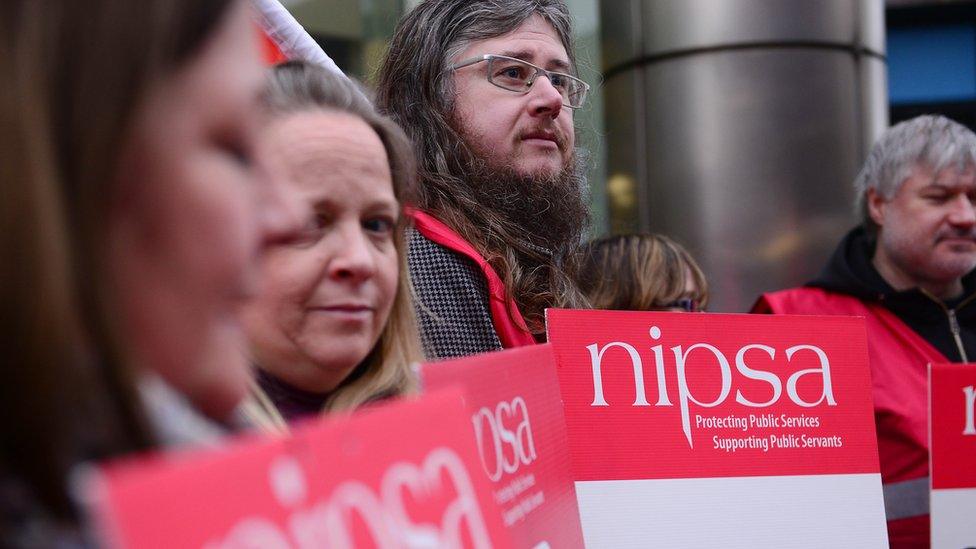Strikes: Thousands attend rallies in major strike over pay
- Published
- comments
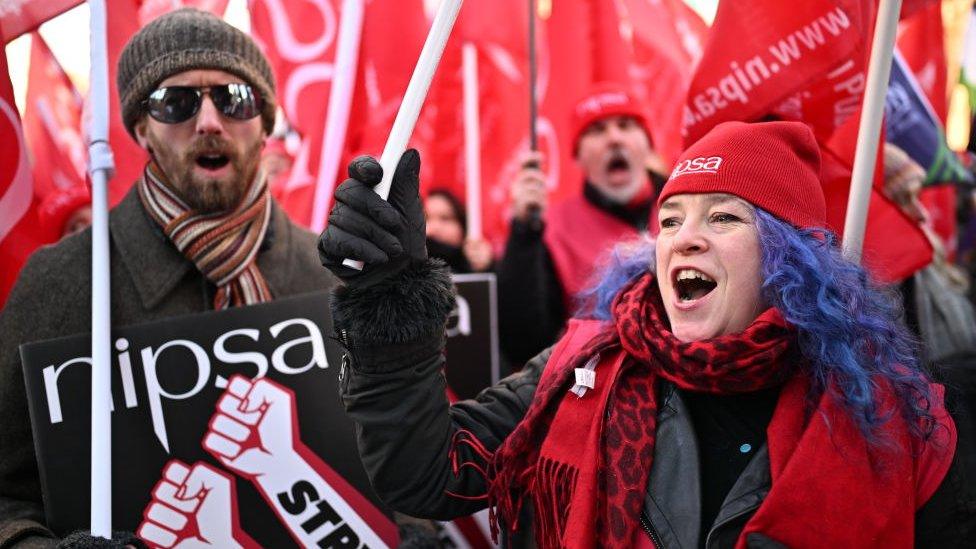
The strike has been billed as the largest in Northern Ireland for 50 years
Thousands of public sector workers have staged rallies during what was billed as Northern Ireland's largest strike in 50 years.
Workers left picket lines to join rallies in Belfast, Londonderry, Omagh, Magherafelt and Enniskillen at lunchtime.
More than 100,000 public sector workers are taking part in the day of action.
It is halting bus and train services, while schools are closed and there is disruption across health services.
Sixteen trade unions are involved in co-ordinated action in a dispute over pay.
Sixteen trade unions are involved in co-ordinated action in the dispute
The largest rally was held at Belfast City Hall where Gerry Murphy of the Irish Congress of Trade Unions said action would continue if no solution was found.
"This is a campaign we will continue, this is a campaign we will win," he said.
Mr Murphy said many were leaving the public sector for better pay and conditions elsewhere and warned services could collapse if this was not stopped.
Meanwhile, hundreds gathered at Guildhall Square in Derry where the crowd was addressed by the civil rights campaigner Eamonn McCann.
Rita Devlin, from the Royal College of Nursing (RCN), said the action "didn't need to happen" and criticised the Northern Ireland Secretary Chris Heaton-Harris for not implementing pay increases.
The UK government has offered a financial package if devolution is restored which would include provisions on pay.
Road gritters are also on strike, leading to travel warnings given the drop in temperature.
Alan Perry from the GMB union said staff would rather be gritting the roads but felt they had "no other option".
"We will evaluate from tomorrow in relation to how we move forward but I have no doubt if there is no resolution to this, there will be further action," he told BBC NI's The Nolan Show on Thursday.
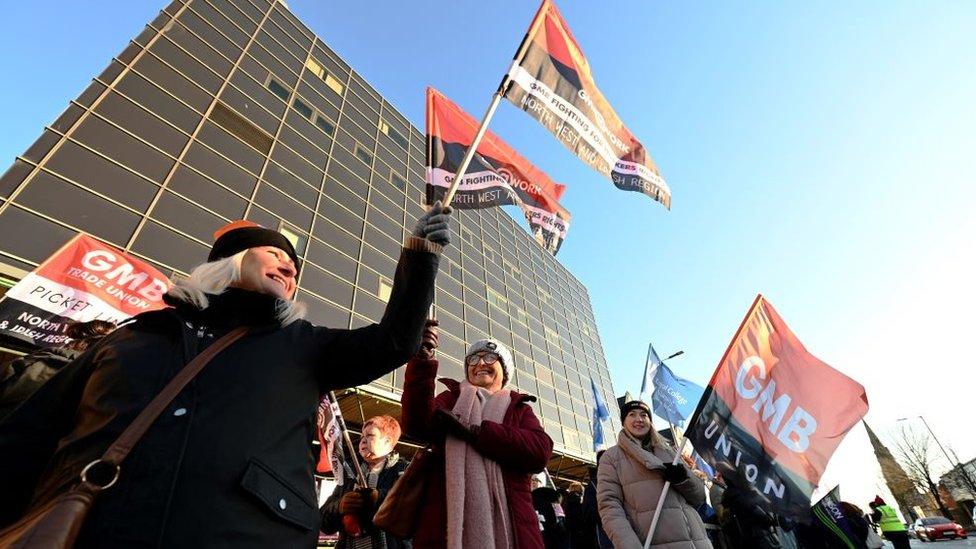
GMB union members picket outside the Mater Hospital in Belfast
Mr Heaton-Harris said public sector is devolved and he was "deeply disappointed" the funding offer had not been taken up by Stormont's parties.
Ms Devlin, whose union took a half-day strike, said health workers did not want to see appointments and procedures disrupted, but added they are "being cancelled every day because of a lack of staff".
'We've had enough'
Damien Doherty, a Unite member and bus driver in Londonderry, said Mr Heaton-Harris and Stormont parties should "commit to long term investment for all of our public services".
"We're hoping to get big numbers out into the rally across all sectors to send a message to Chris Heaton-Harris and other politicians to say, 'look, get your finger out, we've had enough of it'."
People have been advised to only make essential journeys as the combination of icy conditions and a lack of road gritting makes driving hazardous.
The strikes are happening due to escalating pay disputes, with many public sector workers in Northern Ireland paid less than counterparts in the rest of the UK.
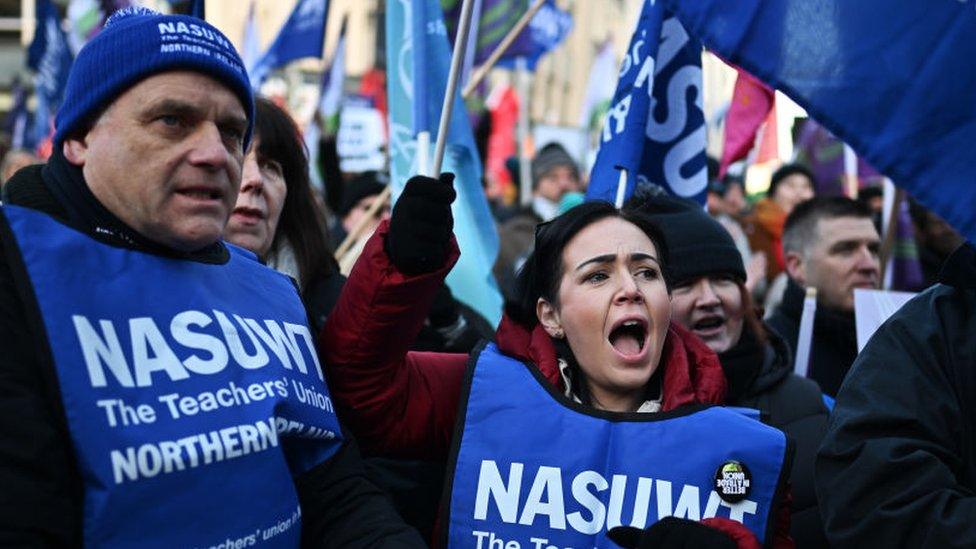
Teaching unions have campaigned for better pay for members
This, combined with the cost-of-living crisis and the ongoing political crisis which has seen Northern Ireland go without devolved government for almost two years, has led to a series of strikes in healthcare, education, transport and other public sectors in recent months.
Addressing the rally in Belfast, Mark McTaggart, from the Irish National Teachers' Organisation (INTO), said that teachers in Northern Ireland were the "worst paid" in the British Isles and had undervalued for many years.
He criticised the DUP leader Sir Jeffrey Donaldson for not restoring an executive and Mr Heaton-Harris for not releasing money to address the pay disputes in the absence of a devolved government.
How will the strike affect me?
The strike will cause widespread disruption.
The Department of Health has said there will be a "significantly reduced health service" and people are advised to take care "to reduce your chances of needing health service treatment".
Northern Ireland strikes: All you need to know in 120 seconds
However, they have also said that if you do require emergency hospital care, "you must seek it immediately".
Most cancer services including chemotherapy treatment will not go ahead. During previous industrial action, these services operated as normal.
Dialysis patients are also affected with just several appointments scheduled across the system.
The strike will compound the daily pressures facing Northern Ireland's health service, which is already struggling with budget problems, severe staff shortages and the worst waiting lists in the UK.
Other services affected by the strike include:
GPs: They are not on strike but will only be operating on an emergency-only basis
Scheduled hospital appointments: Most of them have been cancelled
Ambulances: Will be focused on the most urgent cases
Translink bus and train services: All are cancelled
Schools: Most, if not all, will be closed
Road gritting: Non-major roads will not be treated, and motorists are urged to take care given the icy weather
Courts and tribunals: Offering a limited service


Services are going to take a massive beating today.
While the strike may only last 24 hours, the impact will last for months.
The amount of services that have ground to a halt is almost unthinkable - almost all appointments are cancelled, including chemotherapy and breast screening services.
But staff have been waving red flags for over a decade about pay.
Healthcare staff never want to go on strike - it's against their very ethos - but today is different.
They say there is a lack of leadership, a lack of accountability and services are below an acceptable standard.

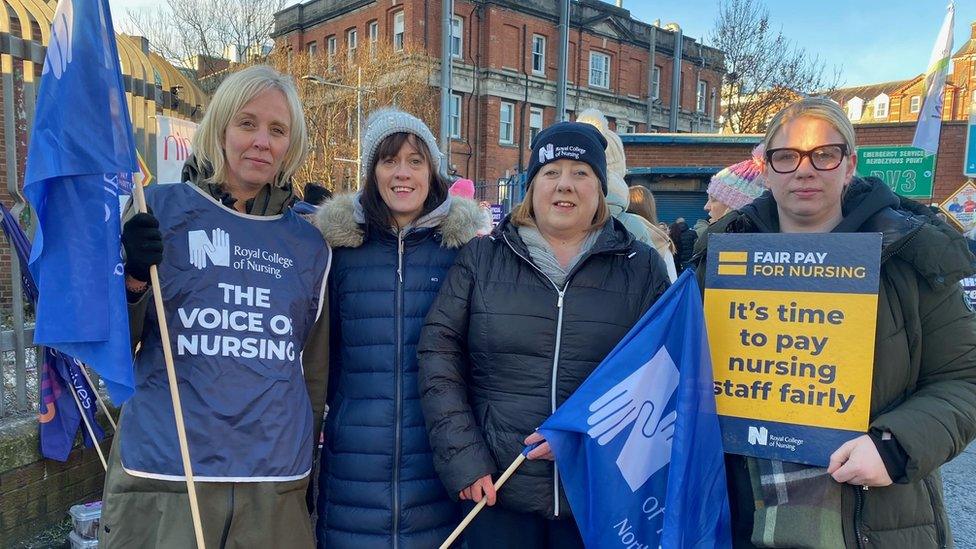
RCN members at the picket line at Royal Victoria Hospital
Why are so many workers going on strike?
Public sector pay in Northern Ireland has fallen sharply in real terms over the last two years due to high inflation, a shortfall in Stormont's budget and a lack of local ministers to allocate existing resources.
As part of political talks aimed at restoring power-sharing government in Northern Ireland, the UK government offered £584m to resolve pay issues as part of a larger deal.
However, that money is dependent on Stormont's return and the Democratic Unionist Party (DUP) has not yet agreed to end its boycott of power-sharing government in Northern Ireland due to its protest against post-Brexit trade rules.
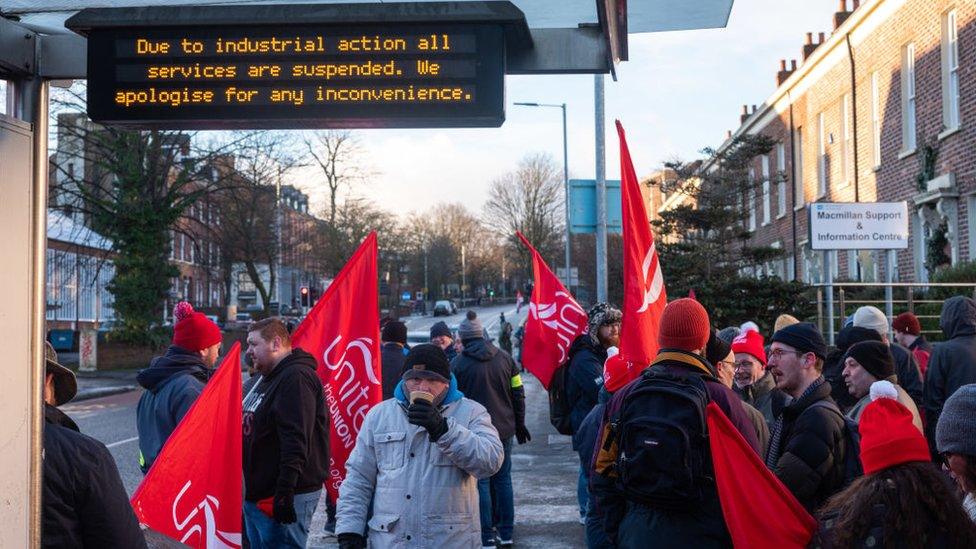
Members of the Unite Union on strike at a bus stop on the Lisburn Road in Belfast
'Dangling the carrot'
Speaking on Thursday, Sinn Féin vice-president Michelle O'Neill said the British government needed to stop "dangling the carrot" and put make the money available to resolve disputes.
"The workers on the street know there is £584m that can be put in their pockets and at this juncture the British government are choosing to use that as a ransom against the DUP," she said.
"The workers are not pawns and they shouldn't be used as pawns. Pay the money and divorce that from the politics and divorce that from the DUP's boycott.".
Unions have been angered by Chris Heaton-Harris making the £584m pay offer conditional on the restoration of devolution.
They argue that public sector workers are being used as "pawns" in an attempt to pressurise politicians to end the standoff.
Political parties in Northern Ireland, including the DUP, have also called on Mr Heaton-Harris to release the money.
- Published18 January 2024
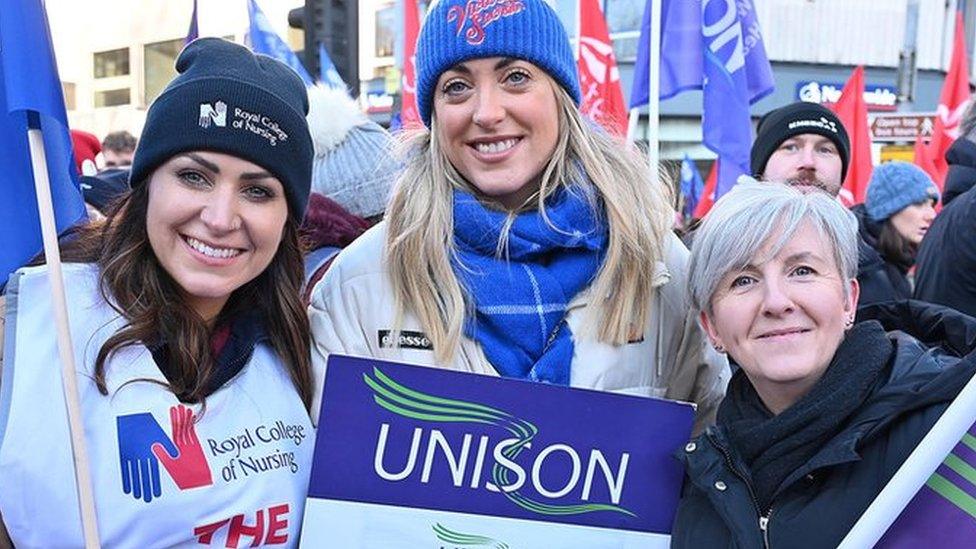
- Published18 January 2024
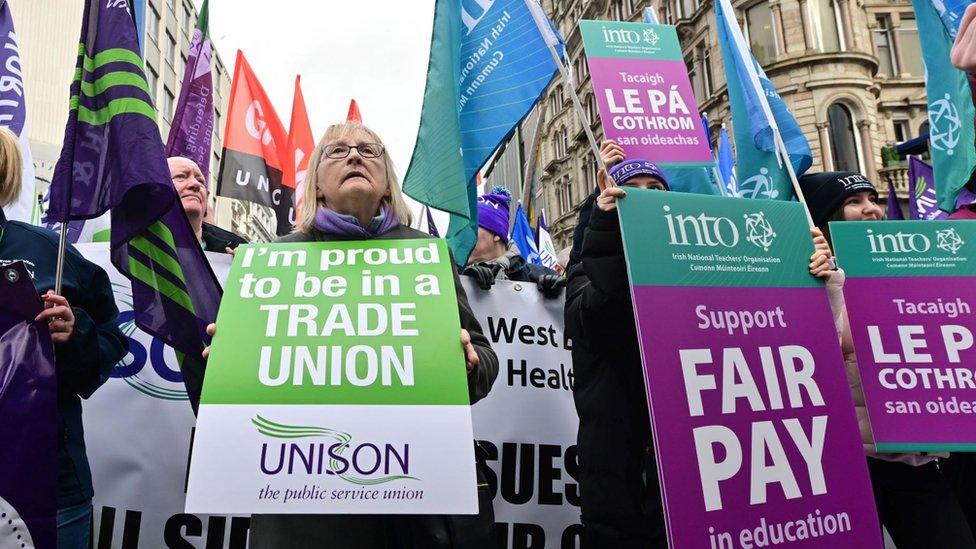
- Published16 January 2024
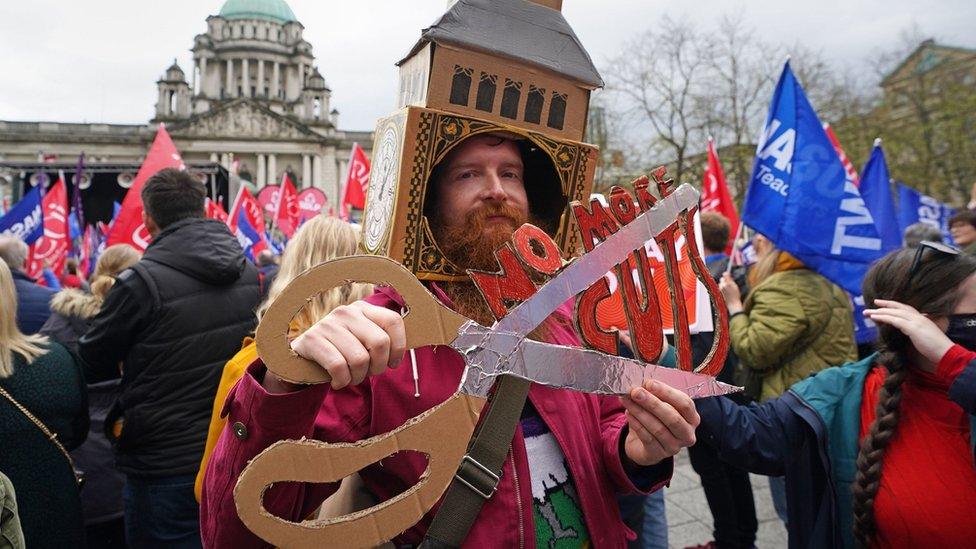
- Published17 January 2024

- Published15 January 2024
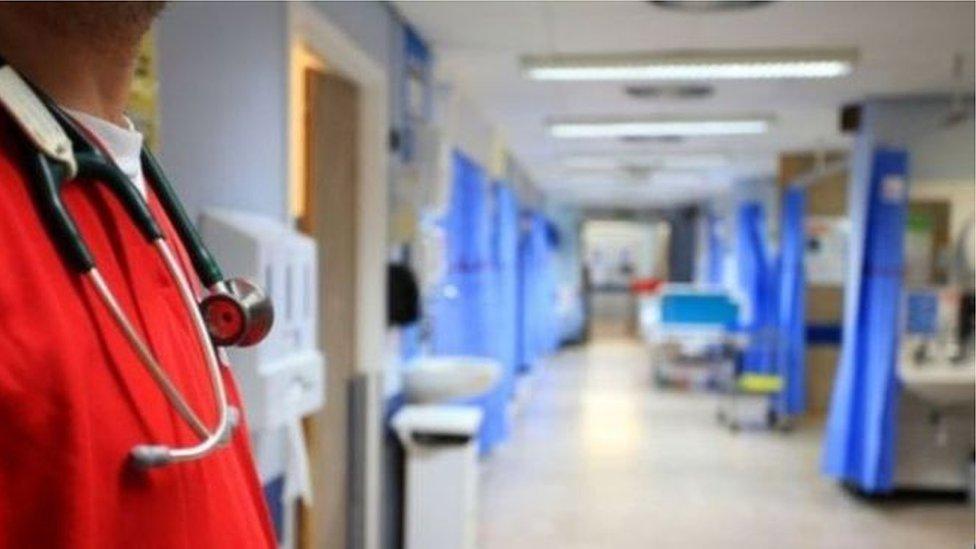
- Published17 January 2024
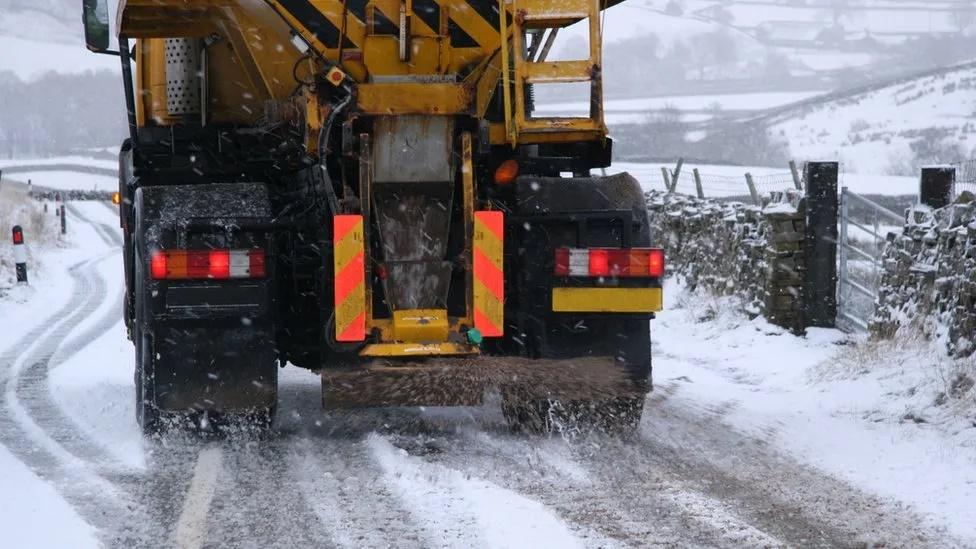
- Published19 December 2023
